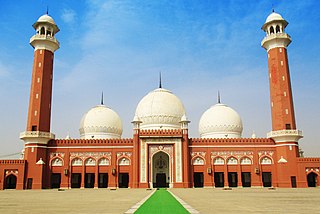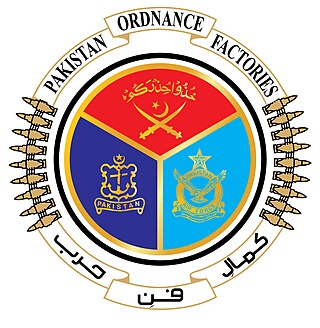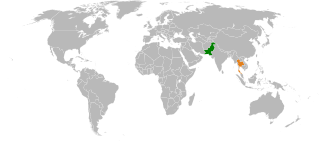Wah is a city in Rawalpindi District, Punjab, in Pakistan. It is famous for the Wah Cantonment, a military camp located in the north of the city. Wah includes a university known as the University of Wah and is close to its sister town of Taxila, located in the same tehsil.

A gas explosion is the ignition of a mixture of air and flammable gas, typically from a gas leak. In household accidents, the principal explosive gases are those used for heating or cooking purposes such as natural gas, methane, propane, butane. In industrial explosions, many other gases, like hydrogen, as well as evaporated (gaseous) gasoline or ethanol play an important role. Industrial gas explosions can be prevented with the use of intrinsic safety barriers to prevent ignition, or use of alternative energy.

The Wah Cantonment is a military base in Wah, Pakistan. It is a part of the Taxila Tehsil of the Rawalpindi District, Pakistan. It is the 24th most populous city in Pakistan by population. The municipality is located 30 km (19 mi) northwest of the metropolitan region of Islamabad-Rawalpindi and southwest of the Haripur District in Khyber Pakhtunkhwa, Pakistan.

The Pakistan Ordnance Factories (POF) is a major firearms and a defence contractor headquartered in Wah Cantt, Punjab, Pakistan. Described as "the largest defence industrial complex under the Ministry of Defence Production, producing conventional arms and ammunition to the international standards" by the Government of Pakistan.
The Defence Industry of Pakistan, established in September 1951, mainly falls under the purview of the Ministry of Defence Production (MoDP). It aims to foster collaboration and oversee the diverse range of military production facilities that have emerged since Pakistan's independence. The MoDP comprises specialized organizations, each dedicated to various aspects of the defence industry, including research and development, production, and administration.
The 2008 Wah bombing was a double suicide attack on the Pakistan Ordnance Factories (POF) in Wah, Pakistan, on 21 August 2008. The attack, which killed more than 100 and wounded over 200 is the deadliest on a military site in Pakistan's history. Both bombers detonated themselves at the factory's gates while workers were changing shifts.

Pakistan and Thailand formally began diplomatic relationships on 10 October 1951. Pakistan maintains an embassy in Bangkok, whereas Thailand maintains an embassy in Islamabad and a Consulate General in Karachi.

The Wah Medical College (WMC) (Urdu: واہ طبی کالج) is a medical college located at Wah Cantonment, Punjab, Pakistan.
These are the list of Terrorist attacks in Pakistan in 2010.
In 2008, Pakistan saw 40 terrorist attacks, which caused 154 fatalities and 256 injuries.
This is a list of terrorist incidents in Pakistan in 2012. Pakistan has faced numerous attacks by insurgents as a result of the ongoing War in North-West Pakistan by the Pakistani military against militant groups, part of the War on Terror. At the same time, there have also been numerous drone attacks in Pakistan carried out by the United States which exclusively target members of militant groups along the Afghan border regions.

Operation Zarb-e-Azb was a joint military offensive conducted by the Pakistan Armed Forces against various militant groups, including the Tehrik-i-Taliban Pakistan (TTP), the Islamic Movement of Uzbekistan, the East Turkestan Islamic Movement and Lashkar-e-Islam. The operation was launched on 15 June 2014 in North Waziristan along the Pakistan-Afghanistan border as a renewed effort against militancy in the wake of the 8 June attack on Jinnah International Airport in Karachi, for which the TTP and the IMU claimed responsibility. As of 14 July 2014, the operation internally displaced about 929,859 people belonging to 80,302 families from North Waziristan.
Operation Radd-ul-Fasaad was a combined military operation by the Pakistani military in support of local law enforcement agencies to disarm and eliminate the terrorist sleeper cells across all states of Pakistan, started on 22 February 2017. The operation aimed to eliminate the threat of terrorism, and consolidating the gains of Operation Zarb-e-Azb which was launched in 2014 as a joint military offensive. It was further aimed at ensuring the security of Pakistan's borders. The operation underwent active participation from the Pakistan Army, Pakistan Air Force, Pakistan Navy, Pakistan Police and other Warfare and Civil Armed Forces managed under the Government of Pakistan. More than 375,000 intelligence-based operations had been carried out as of 2021. This operation has been mostly acknowledged after Operation Zarb e Azb.
On 23 June 2017, a series of terrorist attacks took place in Pakistan resulting in 96 dead and over 200 wounded. They included a suicide bombing in Quetta targeting policemen, followed by a double bombing at a market in Parachinar, and the targeted killing of four policemen in Karachi.
On 12 August 2017, a suicide bombing took place near a Pakistan army truck in Quetta, Balochistan, Pakistan, leaving 15 people dead including 8 soldiers, while injuring 40 others. The Islamic State of Iraq and the Levant – Khorasan Province claimed responsibility for the attack.
Terrorist incidents in Pakistan in 2018 include:
Several violent incidents happened before and on the day of the 2018 Pakistani general election, held on 25 July 2018.
This article is an incomplete outline of terrorist incidents in Pakistan in 2021 in chronological order.





